
PRC Narrates Cyber Victimhood
Executive Summary:
- The People’s Republic of China (PRC) has responded to an alleged U.S. cyberattack on its National Time Service Center (NTSC) by constructing a narrative of empire and victimhood, consolidating its alignment with global south countries against U.S. hegemony.
- Chinese analysts have used the attack as an opportunity to highlight perceived hypocrisy in the declared values of the United States and the U.S.-led international order, calling for stability and a “new cyberspace order.”
- These responses echoed those following alleged Taiwanese cyberattacks earlier this year, which similarly asserted victimhood and attempted to create a more favorable information environment for the PRC to achieve its global aspirations.
On October 19, the Ministry of State Security (MSS; 国家安全部) informed national media that it had disrupted a U.S. cyberattack targeting the National Time Service Center (NTSC; 国家授时中心) (CCTV, October 19). The center is responsible for maintaining and distributing official Beijing Time (北京时间) throughout the People’s Republic of China (PRC), supporting logistics, finance, and energy functions (NTSC, accessed October 20). In response to the attack, state media claimed that the United States is “the biggest source of chaos in cyberspace” (网络空间的最大乱源), while denying what it calls the “PRC cyber threat theory” (中国网络威胁论) (CCTV, October 19).
Earlier this year, the Public Security Bureau of Tianhe District in Guangzhou announced that it had foiled a cyberattack linked to the Information, Communications, and Electronics Force (ICEFCOM; 國防部資通電軍指揮部) of Taiwan’s Ministry of National Defense (Xinhua, June 5). According to the PRC’s National Computer Virus Emergency Response Center (CVERC; 国家计算机病毒应急处理中心), the Taiwanese unit carried out cyberattacks on the country’s military-industrial, government, energy, and transportation sectors over several years (CVERC, June 5). In this case, the PRC responded with a coordinated hybrid warfare campaign, releasing the identities of 20 suspected participants and offering rewards for their arrest (China Brief, July 25).
PRC tactics diverged following the U.S. and Taiwanese incidents. This was likely due to significant differences in intelligence capabilities the MSS has with the United States and Taiwan, as well as the respective positions of the two countries in the international system. The PRC’s rhetorical response to the alleged U.S. cyberattacks also forms part of a wider push to advance its leadership of an anti-Western bloc, constructing a narrative of a one-sided cyber war waged by a “hacker empire” (黑客帝国) (CCTV, October 19).
PRC Leverages Defense and Offense
Speaking at the 2016 Symposium on Network Security and Information Technology, Xi Jinping said that cyber defense and offense are interrelated. He argued that “the essence of cybersecurity is in confrontation” (网络安全的本质在对抗), and called for “using technology against technology” (以技术对技术) to ensure that the PRC is more powerful than any enemy (Xinhua, April 25, 2016).
Since the NTSC attack was announced, government and media sources have echoed this assessment, advocating for strengthening defenses as well as developing offensive capabilities. Media reports have called on network operators to reinforce security and honor their legal duties under the country’s Cybersecurity Law (网络安全法), which attempts to strengthen network security and prevent cyber intrusions (Xinhua, November 7, 2016; CCTV, October 19). In line with Xi’s call to “use technology against technology,” one article argued for “enhancing … cyber defense and retaliatory capabilities” (提升 … 网络防御与反击能力) in order to expose the “hegemonic nature” (霸权本质) of U.S. espionage and sabotage (Kunlun Policy Research Institute, October 26).
PRC cyber activities go beyond the “retaliation” that nationalist commentaries rationalize. “Retaliation” invokes a narrative of victimhood, but it does not reflect the intention behind contemporary PRC cyberattacks. In 2014, the U.S. Department of Justice indicted PLA hackers for the first time, but offensive cyber has since evolved. Recent cyberattacks that embed “disruptive capabilities within U.S. critical infrastructure” represent a development towards “preparation for potential future conflict and a persistent escalation in the cyber domain,” a departure from the theft and espionage of the past (McCrary Institute, October 28). This pivot occurred during Xi’s term and follows his public guidance.
Cyber Narratives Consolidate Global South Alignment
In both the U.S. and Taiwanese cases, Chinese media commentaries and military officials used the incidents to frame the PRC as the victim (China Brief, July 25). But statements diverged on account of the hegemonic position of the United States in the international system. Jin Fei (金飞), deputy leader of a military-civil expert panel, argued that such attacks are a systemic attempt to slow the PRC’s rise, disrupt the country’s economic development, and maintain U.S. dominance (CCTV, October 20). [1]
The NTSC incident also provided an opportunity to showcase the perceived hypocrisy of U.S. values and the norms of the U.S.-led international system. One essay mocked the U.S. claim that it supports internet freedom, arguing that the values it purportedly supports simply “cover its hegemonic ambitions” (掩盖其霸权野心) (Kunlun Policy Research Institute, October 26). Others pointed to the destabilizing effect of cyberattacks on mutual trust, calling on the international community to restrain “digital hegemony” (数字霸权) (CCTV, October 20).
The narrative of digital hegemony reinforces the PRC’s alignment with the Global South by positioning itself as a fellow victim of Western neo-imperialism. For example, official media states that the PRC is not alone in being targeted by U.S. cyberattacks, listing it alongside Southeast Asia, Europe, and Latin America, regions either currently dominated by U.S. leadership or previously victims of U.S. interventions (CCTV, October 19). This characterization of cyberattacks as the continuation of 20th century interventionism is more explicitly evoked in the call to “unite with other countries and regions that have felt the hegemonic pressure of the United States” (联合其他受到美国霸权压迫的国家和地区) (Kunlun Policy Research Institute, October 26). The same author concludes by calling to “establish a fair, just, and transparent new cyberspace order” (建立公平、公正、透明的网络空间新秩序), presumably constructed with the PRC’s leadership (Kunlun Policy Research Institute, October 26). [2]
Conclusion
The PRC’s rhetoric in the wake of the NTSC cyberattack fits its broader goal of preparing the international landscape for its predicted ascent to global leadership. Official narratives fall back on a familiar playbook seen in response to the Taiwanese attack in June. This rhetoric casts the PRC as both victim and vanguard of the international system, pushing a paradoxical narrative of both victimhood and strength. Despite the PRC’s documented record of cyber espionage, state and media narratives instead cast itself as a virtuous actor charting a course away from a U.S.-led world toward a new order with the PRC at its core.
Notes
[1] Jin Fei (金飞) is the deputy leader of the Military-Civilian Innovation Service Professional Committee (军地创新服务专业委员会).
[2] The PRC’s Global Governance Initiative concept paper, released during the Shanghai Cooperation Organization (SCO) summit in September, listed cyberspace governance as a priority area for reform. The SCO may continue to act as a vessel for the PRC to counter what it describes elsewhere as “digital hegemony” (Ministry of Foreign Affairs, September 1).


